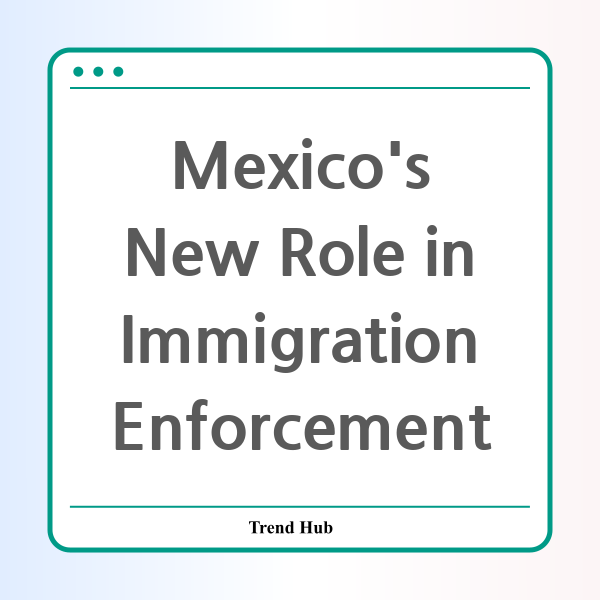* This website participates in the Amazon Affiliate Program and earns from qualifying purchases.

As the immigration landscape continues to evolve in the United States, Mexico finds itself at the forefront of new policies and challenges. President Claudia Sheinbaum's recent agreement to accept non-Mexican deportees from the U.S. marks a significant shift in Mexico's immigration policy. With over 4,000 deportees received in just a week, the implications of this change are vast, affecting not just Mexico, but the broader relationships in the region.
The backdrop of this decision is the newly revived "Remain in Mexico" policy under President Donald Trump. This policy mandates that asylum seekers must stay in Mexico while their claims are processed in the U.S. However, the practicality of enforcing such a policy hinges on the cooperation of the Mexican government, which has shown signs of resistance. President Sheinbaum's previous stance against accepting non-Mexican migrants seeking asylum highlights the complexities involved in cross-border immigration policies.
In recent discussions, it has become clear that many countries, including Brazil and Colombia, have raised concerns over the treatment and deportation of their citizens by the U.S. This international pushback complicates Trump's border strategy, especially as nations like Cuba, Venezuela, and China are also refusing to accept their deportees back from the United States. This rising reluctance among countries to accept their nationals complicates the very foundation of Trump’s ambitious border plans.
Understanding the Implications of Non-Mexican Deportations
The acceptance of non-Mexican deportees by Mexico introduces several logistical challenges. For one, many of these migrants come from nations that either do not have diplomatic relations with Mexico or do not cooperate with the deportation process. Reports indicate that as of fiscal 2024, around 38,000 nationals from China were apprehended at the U.S.-Mexico border, with numbers continuing to rise. It raises the question: How should Mexico navigate the complexities of accepting migrants who do not hold citizenship in its own country?
This situation is further complicated by the nature of migration itself. The migration patterns have shifted considerably, with more individuals flying into Mexico or Canada and subsequently crossing into the U.S. This shift signifies a change in the demographics and origins of migrants, moving away from primarily Latin American backgrounds to include individuals from Asia and the Middle East, which many Mexican officials deem problematic.
Collaboration vs. Resistance
As negotiations between the U.S. and Mexico continue, the question of cooperation becomes central. Historically, agreements like the “Remain in Mexico” policy were reached through intricate negotiations, often involving economic incentives from the U.S. The previous administration’s threats of tariffs played a crucial role in convincing Mexico to agree to host migrants temporarily. This historical context illustrates the delicate balance of power in U.S.-Mexico relations, particularly concerning immigration.
Current discussions among lawmakers in both the U.S. and Mexico indicate a growing consensus that future immigration policies will require solid frameworks of cooperation. However, as seen through Sheinbaum's administration, Mexico’s resistance might ultimately serve as a critical check on the U.S.’s more aggressive immigration policies.
The Human Cost
While policy discussions are crucial, the human cost of deportation and the treatment of migrants must not be overlooked. Critics warn that policies requiring asylum-seekers to wait in Mexico could expose vulnerable populations to risks from violent cartels, which have been known to exploit and threaten migrants. Reports highlight that these individuals may face a dire situation, being forced into regions controlled by criminal organizations where safety and security are far from guaranteed.
This reality poses deep ethical questions about immigration policies and the responsibilities of the U.S. and Mexico as they navigate the complex web of national security, human rights, and international cooperation. The future of U.S.-Mexico immigration policy lies not only in political agreements but also in addressing the humanitarian implications of these decisions.
In conclusion, Mexico’s evolving role in immigration enforcement is a significant aspect of the current geopolitical landscape. The balance between accepting deportees, managing the influx of migrants from diverse backgrounds, and ensuring human rights will continue to shapeMexico’s immigration policy. Both the Mexican and U.S. governments must tread carefully as they navigate these turbulent waters, ensuring that the complexities of migration are met with comprehensive, humane solutions.
* This website participates in the Amazon Affiliate Program and earns from qualifying purchases.